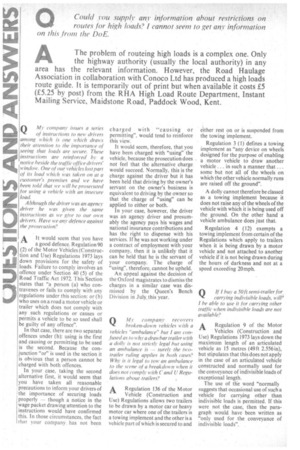Q My company issues a series of instructions to new
Page 86

If you've noticed an error in this article please click here to report it so we can fix it.
drivers among which is one which draws their attention m the importance of seeing that loads are secure. These instructions are reinforced by a notice beside the traffic office drivers' window. One of our vehicles lost part of its load which was taken on at a customer's premises and we have been told that we will he prosecuted for using a vehicle with an insecure load.
Although the driver was an agency driver he was given the same instructions as we give to our own drivers. Have we any defence against the prosecution?
AIt would seem that you have a good defence. Regulation 90 (2) of the Motor Vehicles (Construction and Use) Regulations 1973 lays down provisions for the safety of loads. Failure to comply involves an offence under Section 40 (5) of the Road Traffic Act 1972. This Section states that "a person (a) who contravenes or fails to comply with any regulations under this section: or(b) who uses on a road a motor vehicle or trailer which does not comply with any such regulations or causes or permits a vehicle to be so used shall be guilty of any offence".
In that case, there are two separate offences under (b): using is the first and causing or permitting to be used is the second. Because the conjunction "or" is used in the section it is obvious that a person cannot be charged with both offences.
In your case, taking the second alternative first, it would seem that you have taken all reasonable precautions to inform your drivers of the importance Of securing loads properly — though a notice, in the wage packet drawing attention to the instructions would have confirmed this. In those circumstances, the fact that your company. has not been charged with "causing or permitting", would tend to reinforce this view.
It would seem, therefore, that you have been charged with "using" the vehicle, because the prosecution does not feel that the alternative charge would succeed. Normally, this is the charge against the driver but it has been held that driving by the owner's servant on the owner's business is equivalent to driving by the owner so that the charge of "using" can be applied to either or both.
In your case, however, the driver was an agency driver and presumably the agency pays his wages and national insurance contributions and has the right to dispense with his services. If he was not working under a contract of employment with your company, then it is unlikely that it can be held that he is the servant of your company. The charge of "using", therefore, cannot be upheld.
An appeal against the decision of the Oxford magistrates to dismiss the charges in a similar case was dismissed by the Queen's Bench Division in July, this year.












































































































































